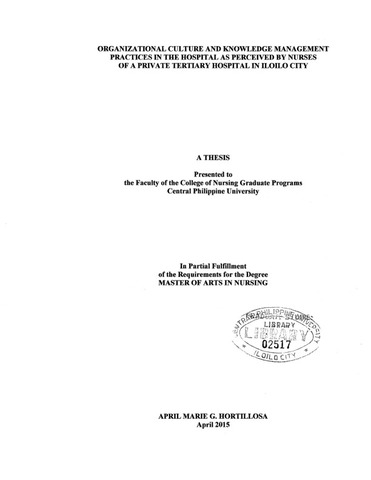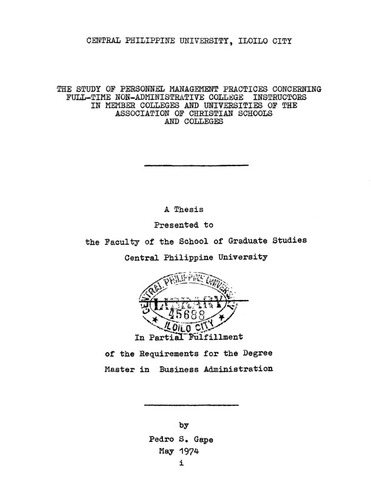Organizational culture and knowledge management practices in the hospital as perceived by nurses of a private tertiary hospital in Iloilo City

Page views
858Date
2015Author
Thesis Adviser
Defense Panel Chair
Share
Metadata
Show full item record
Abstract
The main objective of the study was to determine the organizational culture and knowledge management practices in the hospital as perceived by nurses of a private tertiary hospital in Iloilo City. More specifically, this study aimed to determine the personal characteristics of the respondents, the organizational culture in terms of dominant characteristics, organizational leadership, management of employees, organizational glue, strategic emphases, and criteria of success, the knowledge management of nurses such as creating knowledge, capturing knowledge, organizing knowledge, storing knowledge, disseminating knowledge and applying knowledge. The study also determined if there is a relationship between personal characteristics and organizational culture, between personal characteristics and knowledge management; and between the nurses’ perception on the organizational culture and their knowledge management.
This is a descriptive-relational study which employed the one-shot survey design. Data were collected from 144 nurses using a standardized instruments on Organizational Culture Assessment Instrument (Cameron & Quinn, 1999) and Knowledge Management Assessment Instrument (Lawson, 2002). Permission to conduct the study was secured xiv from the Hospital Director and Nursing Service Office prior to the administration of instruments. Data were processed electronically using the Statistical Package for the Social Sciences (SPSS) version 22. Statistical analysis was done using frequency distribution and means for description and Chi-square and Gamma test for the relationships.
Findings revealed that the nurses studied were mostly female, single, with a mean age of 27.82 years, have been serving the hospital for an average of 2.08 years, and were graduates of BSN. In addition, of the seven components of organizational culture, all were rated “good” by the nurses. The component which was rated “good” by the biggest proportion was strategic emphases, while the component which was rated “poor” by the biggest proportion was criteria of success. The over-all rating for organizational culture was good.
Moreover, the seven components of knowledge management were rated good. The component which was rated “good” by the biggest proportion was applying knowledge; while the component which was rated “poor” by the biggest proportion was storing knowledge. The over-all rating for knowledge management was good.
A significant relationship was found between sex and organizational leadership, length of service and organizational leadership, and sex and strategic emphases. On the other hand, no significant relationship was found between age, civil status, length of service, educational attainment and perception on organizational culture. This findings rejects the hypothesis that there is no relationship between personal characteristics and perception on organizational culture.
No significant relationship was found between age, sex, civil status, length of service, educational attainment and knowledge management which confirms the hypothesis that there is no relationship between personal characteristics such as sex, age, civil status, length of service and educational attainment and knowledge management as to creating knowledge, capturing knowledge, organizing knowledge, storing knowledge, disseminating knowledge, and applying knowledge.
All components of organizational culture were found to influence knowledge management. The p-values (.000) indicate a significant relationship between all pairs of variables which negate the hypothesis that there is no significant relationship between perception of organizational culture and knowledge management of nurses.
The two-fold role of culture, both as the main obstacle and also as the empowering factor in knowledge management activities, makes the importance of this factor double in efficient managing of knowledge management processes. Therefore, nurses should not ignore organizational culture. Rather, it should be addressed in the hospital’s mission, vision and goal statements as well as emphasized in organization sponsored training and communication in order to ensure successful implementation of knowledge management.
Organizations need to develop a culture which encourages members to share knowledge in order to gain a strategic advantage. The impact of organizational culture on knowledge management still requires further research.
Description
Abstract only
Suggested Citation
Hortillosa, A. M. (2015). Organizational culture and knowledge management practices in the hospital as perceived by nurses of a private tertiary hospital in Iloilo City (Unpublished master thesis). Central Philippine University, Jaro, Iloilo City.
Type
ThesisSubject(s)
Department
School of Graduate StudiesDegree
Master of Arts in NursingShelf Location
GSL Theses 610.73072 H789
Physical Description
iii, 172 leaves
Collections
Related items
Showing items related by title, author, creator and subject.
-
Analysis and development of a meticulous management indicator system for medical cosmetology hospitals in China: The experience of Hangzhou Victoria Medical Cosmetology Hospital
Wang, Lebo (2014)On the basis theoretical and empirical research, this study aimed to develop a meticulous management indicator system that can be used as an evaluation tool, not only of Victoria Medical Cosmetology Hospital of Hangzhou, ... -
The study of personnel management practices concerning full-time non-administrative college instructors in member colleges and universities of the Association of Christian Schools and Colleges
Gape, Pedro S. (1974)Introduction It is generally assumed that the success or failure of any human pursuit depends on the type of personnel who perform the assigned tasks necessary to the accomplishment of the desired objective. This is true ... -
Web-based disaster risk reduction and management assistance system for the CDRRMO (City Disaster Risk Reduction and Management Office) of Iloilo City
Amigo, Karina Inovah Marie; Braga, Neimark; Juarez, Ian Joseph; Haro, Sherwin Dane Zauro; Deduro, Sherah Lou; Botavara, Charles (2016)Database construction and maintenance has evolved into one of the most critical aspects of the day-to-day operations of the modern business company especially as the world completes its transition into the digital age. The ...




